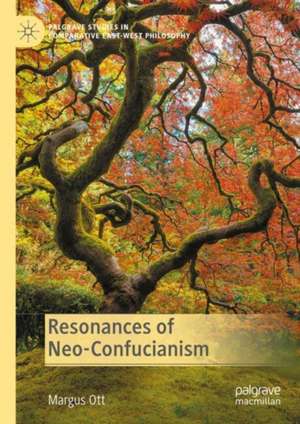Resonances of Neo-Confucianism: Palgrave Studies in Comparative East-West Philosophy
Autor Margus Otten Limba Engleză Hardback – 29 mai 2024
Preț: 698.62 lei
Preț vechi: 821.91 lei
-15% Nou
Puncte Express: 1048
Preț estimativ în valută:
133.72€ • 145.30$ • 112.40£
133.72€ • 145.30$ • 112.40£
Carte tipărită la comandă
Livrare economică 21 aprilie-05 mai
Preluare comenzi: 021 569.72.76
Specificații
ISBN-13: 9783031568732
ISBN-10: 3031568737
Pagini: 288
Ilustrații: XI, 250 p. 3 illus.
Dimensiuni: 148 x 210 mm
Greutate: 0.47 kg
Ediția:2024
Editura: Springer Nature Switzerland
Colecția Palgrave Macmillan
Seria Palgrave Studies in Comparative East-West Philosophy
Locul publicării:Cham, Switzerland
ISBN-10: 3031568737
Pagini: 288
Ilustrații: XI, 250 p. 3 illus.
Dimensiuni: 148 x 210 mm
Greutate: 0.47 kg
Ediția:2024
Editura: Springer Nature Switzerland
Colecția Palgrave Macmillan
Seria Palgrave Studies in Comparative East-West Philosophy
Locul publicării:Cham, Switzerland
Cuprins
Chapter 1. Introduction.- Chapter 2. School of Veins I. Veins and Energy.- Chapter 3. School of Veins II. Deleuze’s Three Syntheses of Time and Zhu Xi’s Feeling, Nature, and Mind.- Chapter 4. School of Veins III. Self-Cultivation. Actualization and Counter-Actualization.- Chapter 5. School of Energy qi 氣: Zhang Zai.- Chapter 6. School of Mind: Wang Yangming.- Chapter 7. Summary.
Notă biografică
Margus Ott received a PhD in philosophy at Tallinn University in 2014. He has an extensive publication record in Estonian, including a series of six books of philosophy, a monograph on Chinese music and divination, and a translation of Zhuangzi's "Inner Chapters".
Textul de pe ultima copertă
This book “resonates” the work of Chinese and Western philosophers, developing ontological ideas that are neither purely Chinese nor Western. In so doing, it argues that Deleuzian idea of “resonance” offers a model for a new way of doing comparative philosophy in which the comparison actualizes the virtual and counter-actualizes the actual in both compared traditions. More particularly, Neo-Confucian thinkers Zhang Zai (1020–1077), Zhu Xi (1130–1200), and Wang Yangming (1472–1529) are resonated with Baruch Spinoza (1632–1677), Arthur Schopenhauer (1788–1860), Husserlian phenomenology, and Gilles Deleuze (1925–1995). The three Chinese thinkers represent three distinct currents of Neo-Confucianism: the school of veins (li) of Zhu Xi, the school of energy (qi) of Zhang Zai, the school of mind (xin) of Wang Yangming. The method of resonance is used to discuss the following topics: dichotomy of veins and energy, temporality and subjectivity, self-cultivation, all-embracing energy, dichotomy of primary ability and primary knowledge.
Margus Ott received a PhD in philosophy at Tallinn University in 2014. He has an extensive publication record in Estonian, including a series of six books of philosophy, a monograph on Chinese music and divination, and a translation of Zhuangzi's "Inner Chapters".
Margus Ott received a PhD in philosophy at Tallinn University in 2014. He has an extensive publication record in Estonian, including a series of six books of philosophy, a monograph on Chinese music and divination, and a translation of Zhuangzi's "Inner Chapters".
Caracteristici
New ontological ideas Proposes the idea of resonance as a new methodology for comparative philosophy Puts Deleuze, Spinoza, Husserl, and Schopenhauer in conversation with Zhang Zai, Zhu Xi, and Wang Yangming







